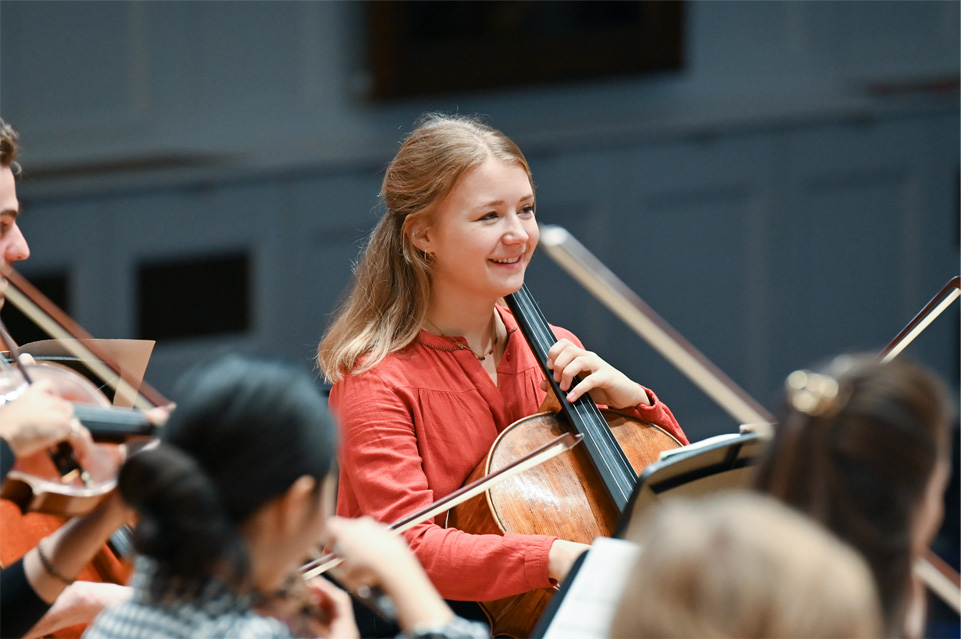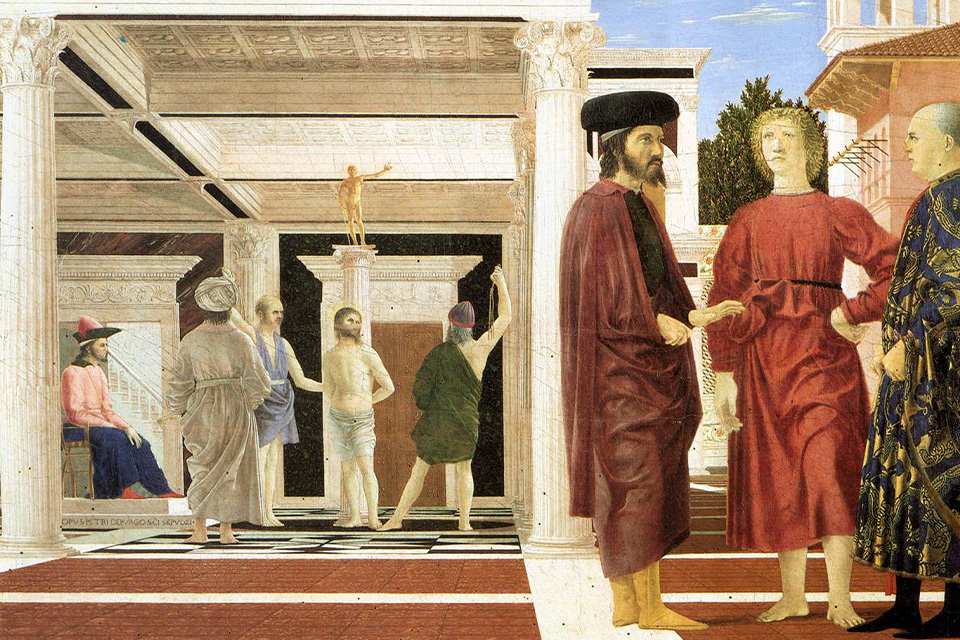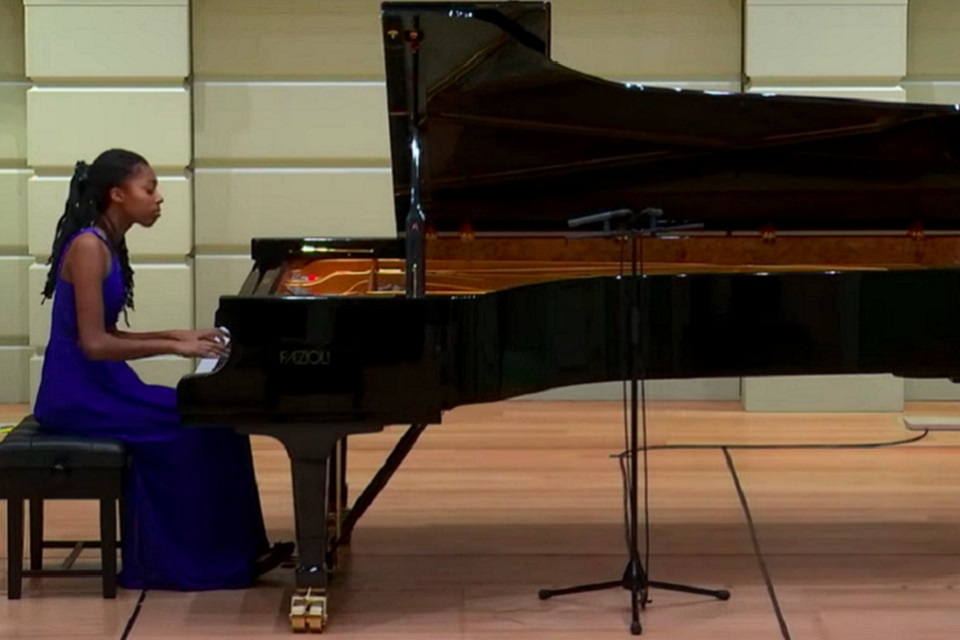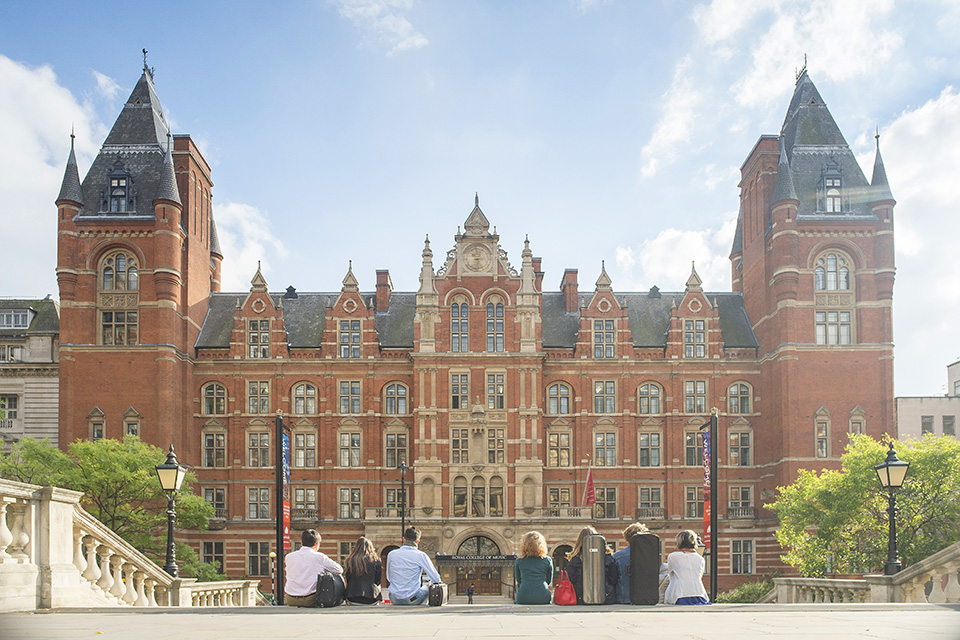Inside the Diversity Action Group: recollections and insights from the RCM community
Share #UpbeatOnline
The RCM launched its Diversity Action Group (DAG) in 2020, beginning an internal process of discussion and review that was instrumental in shaping the College’s new Equality, Diversity and Inclusion strategy, released in January 2021.
In this feature, key participants in the DAG share their thoughts about the work of the action group, their personal perspectives and how lasting change can be achieved.

Director of Programmes Diana Salazar
Dr Diana Salazar, Director of Academic Programmes
A key member of the DAG since its inception, Diana was recently appointed Chair of the initiative following Professor Richard Wistreich’s retirement. Here she discusses the challenges faced by underrepresented groups in classical music and her own sense of duty in pushing progress forward.
There’s no doubt that 2020 was a wake-up call for me personally and professionally. As I watched the Black Lives Matter protests unfold, I became acutely aware of my own privilege, past and present, and how this had enabled me to navigate all kinds of musical, educational and social systems with relative ease, without encountering the barriers, bias or discrimination that so many others experience. I felt shame as I surveyed the world of classical music and identified numerous groups who had been excluded or were barely visible in our musical world.
At the same time, I reflected on my situation as a female academic and composer, and one working in music technology, a notoriously male-dominated field. Was there more I could have done in the past to challenge certain behaviours and attitudes I had experienced? All too often it had seemed easier to accept and maintain the status quo, and I wondered if my lack of action in uncomfortable situations had, unintentionally, perpetuated inequalities for my peers.
For too long, discussions about race, gender and class representation in classical music, past and present, have been located on the periphery of our discipline. Last year my colleague Richard Wistreich founded the DAG and he was overwhelmed by the positive response to its launch. Everyone who came forward to offer support was passionate about moving these difficult conversations about representation to centre stage. Among the group there was, and remains, a huge passion for raising awareness of diversity across the College.
Now, eight months on, the challenge is keeping up the momentum and translating this energy into tangible changes and measurable impact. I now chair the DAG, although in all honesty I cannot proclaim to be an expert in diversity or someone who has experienced racism first hand. But I hope what matters most is that I’m willing to listen, learn and change. One of the greatest sources of inspiration for me has been listening and learning from student and staff members of the DAG, who are all so committed.
So how do we go about changing classical music, an artform that is steeped in tradition? This kind of change is not something that any one individual, no matter their position, can achieve on their own. It requires everyone in the College, not just those in the DAG, to play a part.
First, we need to step outside our cultural sphere to view ourselves and our surroundings. This critical distance is essential to reveal the inequalities in our discipline, inequalities that many of us have come to accept as normal or simply ‘the way things are’. In taking this step, we can develop awareness of the issues.
Second, we need to see change as a positive step forward for our art-form and realise our responsibilities as change-makers. Making a conscious choice to explore a work by an underrepresented composer, calling out bias, being an ally for those who are underrepresented, or simply talking openly about diversity issues, all help to strengthen our musical community as a safe and respectful place for everyone. Everyone has a role to play.
My message to all College students and staff is you belong here. Everyone belongs here. Let’s work together to make that message visible in and through all aspects of our work.

Niki Moosavi, student and RCMSU Diversity Officer
Niki Moosavi, RCM Students’ Union Diversity Officer and fourth-year BMus cellist
Here Niki describes her own frustration with feeling unable to effect change, and her excitement at the chance to be heard as a member of the DAG committee.
When witnessing the murders of innocent people in the USA and seeing the rise of Black Lives Matters protests, I felt sad and angry, but I also felt very frustrated. I wanted to be able to do something to help this injustice, but I was aware that this problem is a result of centuries of systematic racism, and I felt very powerless.
In June 2020, Richard Wistreich sent out an email inviting staff and students to form a Diversity Action Group at the RCM. I did not know what to think of it, but I knew I wanted to help make a change, even if small and local. I anticipated I might voice my opinion a couple times at meetings and all the change would be left to the 'grown-ups' and I would get back to my usual routine of practice etc. soon after. To be honest, I also thought things would die down by September.
Since my school days I’ve always been told that the student voice is valued, but in the DAG meetings this was the first time I felt this were true. My voice, as well as Mebrakh Houghton-Johnson’s and Avishka Edirisinghe’s (both RCM students), was being listened to and our opinions were respected. It felt really good!
We had a few initial meetings with everyone, and it was amazing to have discussions and debates on how to move forward. One example that sticks with me is when two members of the group had conflicting thoughts on the use of photos of black students in advertising - is it positive, as it lets young black people know that RCM is a place where they can study, or is it negative, because we are falsely advertising how diverse our student population is? I still don’t know the ‘right’ answer.
We eventually split into subgroups, and I led the curriculum subgroup. I felt very under qualified to do so - I hadn’t known of any black composers until recently and my knowledge on other underrepresented composers was very limited. I did not know how best to approach amending the curriculum to make it more inclusive and diverse, but with the help of the members of my subgroup we managed to find a pretty good solution.
From here, I would love to see the energy and commitment to positive change of the DAG spread to the wider College community. We are a majority white and middle-class College. We could choose to ignore this issue because it does not affect the majority of us, or we can choose to be allies and do our part to battle systematic racism and white supremacy.

Ruth Keattch
Ruth Keattch, member of the RCM Council
Ruth tells Upbeat how proud she is that being a member of the DAG is now an integral part of her association with the RCM, and about the work she wants to see in making the DAG a force for lasting change.
I am an independent member of the College’s governing Council and of the Investment Committee. Within DAG, I have a particular focus on governance and leadership. I also belong to DAG’s Core Group which disseminates the output of all the working groups.
During my long career in financial services, I had first-hand experience of the challenges facing women in a world made up predominantly of men. It took me some time to recognise the parallel issues confronting other underrepresented groups, including black and disabled people, and to start to promote opportunities for them too. There is much catching up to do. I am very proud to be a member of DAG at this important time.
Already, this has been an intensely rewarding experience. I have learned a great deal about the power of collaboration in promoting real change at RCM. I have heard the voices of students, support staff and teachers with whom I have not previously had any contact. All are respected and encouraged. The working groups are ‘safe places’ where uncomfortable truths can be aired, such as the subconscious bias that saw one auditioning student almost ejected from our premises because of his colour.
Members of Council and its committees have long recognised the need to diversify and to lead by example, principles which are now baked into the Higher Education Code of Governance. Yet, while female representation is healthy, there has been little progress elsewhere. It is all too easy to be cynical, so an early challenge for DAG has been to make the case that things do need to change.
Things really are different this time! The shocking death of George Floyd last May gave renewed voice to the Black Lives Matter movement. It struck common conscience in part because, simultaneously, Covid was revealing the extraordinary sacrifices of undersung, often ethnically diverse heroes. There was a shift in priorities across the nation. At the RCM, the creation of the DAG and its over-arching Equality, Diversity and Inclusion Committee (which reports jointly to Council and Senate - a College first) was an emphatic demonstration of intent.
Much early work has taken place behind the scenes. For the diversity initiative to succeed, DAG needs to define meaningful targets and benchmarks against which performance can be measured. There will be visible signs of change too. These will be well-grounded, pioneering moves. Uncomfortable to some initially, perhaps. But without its pioneers, where would the women’s movement be today?

Natasha Loges
Dr Natasha Loges, Head of Postgraduate Programmes
Natasha tells Upbeat about how her perspective as a woman of colour and a historian has long made her aware of the inequities within this industry, and how it is in the power of our love of music that she finds cause for hope.
When the Black Lives Matter demonstrations erupted in summer 2020, many people pointed out that the BLM movement had existed for seven years, and that inclusion, diversity and equality had been pressing issues for longer still. So, like many people from a minority ethnic background, I initially found this sudden explosion of energy confusing, distressing and untrustworthy.
As a historian who worked on music and gender, I was aware of the powerful hierarchies, privileges and networks which underpin art music. Within my lifetime, the classical music industry had remained impervious to decades of feminism and black history awareness, reams of equality legislation, and hours of unconscious bias training.
Pleas for greater open-mindedness towards underrepresented music would stall on the question of ‘quality’ but the definition of this was elusive. Change was blocked by a vicious cycle: conservatoires usually blamed the profession, which, in turn, blamed the anonymous, unaccountable public, and the public simply got what it received.
But perhaps the real problem was the fear of the unknown. How would one know if this underrepresented repertoire was any good? How could it be talked about, taught, marked? What new people, ideas and values might these changes bring? How would it change ‘us’? And what would happen to the music we loved?
The RCM faced these questions bravely last summer, initially under the leadership of Professor Richard Wistreich. Driven by a keen sense of justice, he ran several open consultations which led to the formation of the Diversity Action Group, a broad collective of RCM staff and students. The guiding principles were established and integrated into every RCM committee in a remarkably short time.
DAG meetings can be exciting, thought-provoking, challenging and draining. Discussions are frank. It can be devastating to hear a first-hand account of discrimination; to recognise the speaker’s grief and anger; to examine one’s own complicity; and to recall one’s own similar experiences. It is a time of transition. But this collective endeavour has already brought me numerous enriching new ideas, connections with people and much wondrous music.
It is still unclear why George Floyd’s death so powerfully catalysed change, and whether that change is lasting. However, the combination of conscience and brilliance on display is irresistible, and our shared sense of the incomparable value of music – and those who make it – inspires me with optimism for the future.

















